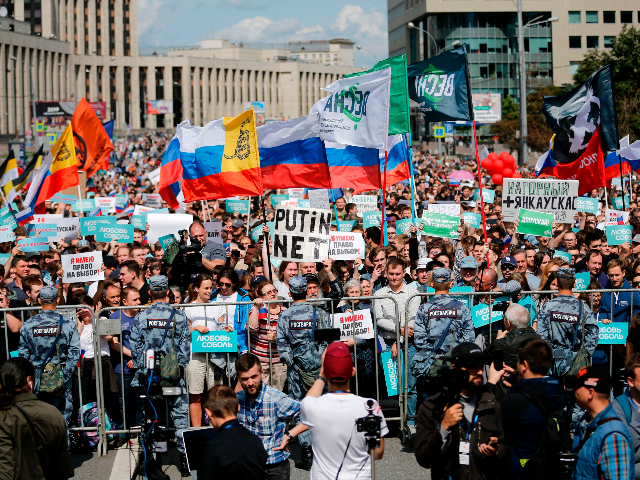The highly controversial Moscow elections were held on Sunday, and the results were not good for President Vladimir Putin’s United Russia party, although not quite the bloodbath they feared after a summer of surprisingly large protests.
In the end, United Russia held its majority by winning 25 out of 45 seats in the Moscow parliament, giving up a third of the seats it held after the 2014 election. The leader of United Russia in Moscow, Andrei Metelsky, was among the losers.
The result is clearly a setback, although not too shabby considering that no one actually ran as a United Russia candidate in Moscow. The candidates all rebranded themselves as “independents” to evade public anger at the party.
The even worse news for reform-minded Russians is that the Communist Party was the second biggest winner, up to 13 seats from five. Two opposition parties, Yabloko and Fair Russia, won three seats apiece.
As Yabloko winner Daria Besedina pointed out, “these were not real elections” because many “genuine” opposition candidates were blocked from appearing on the ballot. This, along with growing dismay at Russia’s slipping economy and public anger at corruption, sparked the summer protests.
“Moscow needs normal elections,” Besedina declared.
Both the Kremlin and its most feisty critic, frequently-jailed opposition leader Alexei Navalny, expressed satisfaction with the election results.
“In general, the election campaign across Russia was very successful for the United Russia party. It won more in some places than others. But in general for the country the party showed its political leadership,” said Kremlin spokesman Dmitry Peskov.
Navalny countered that his program of “smart voting” – in essence, voting for anyone except the United Russia candidate to give the party a black eye even though genuine alternative candidates were kept off the ballot – delivered a “fantastic result.”
Some United Russia critics grumbled that Navalny’s tactics wound up persuading voters to support some candidates who almost always vote the same way as United Russia. On the other hand, Navalny ally Lyubov Sobol told CBS News on Monday that some of the candidates elected by smart voting have quietly pledged to work with the opposition.
Accusations of election fraud flew on all sides, as critics of Putin and his party filled social media with photo and video evidence of blatant ballot-box stuffing, and Russian telecom agency Roskomnadzor accused Facebook and Google of promoting the anti-United Russia protest movement and illegally displaying some election ads. Reuters quoted some soldiers who said they were ordered to vote for pro-Kremlin candidates and required to furnish photographic evidence of their ballots.
United Russia seemed to do fairly well outside of Moscow, especially in provincial governor elections, but it took a shellacking in far eastern Khabarovsk and the Siberian city of Irkutsk.

COMMENTS
Please let us know if you're having issues with commenting.